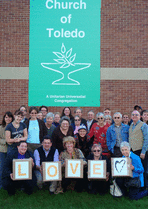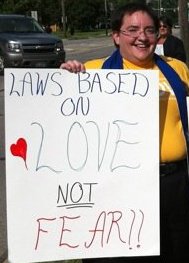Social Justice

Cornell West writes, “justice is what love looks like in public.” I believe love is the cornerstone of my ministry whether I am meeting someone who is sick in a hospital room, preaching from the pulpit, working on a budget, or marching down the street for human rights- it is ALL about love. My parents instilled in me the importance of speaking up and I remember attending my first protest at the age of three, shouting “HELL NO WE WON’T GLOW” against the construction of a power plant in Indiana. I am committed to justice so that I can ensure that the world is left a little better than I found it. I have participated in actions for immigration reform, LGBTQ equality, anti-poverty, anti-war, and more. I facilitate workshops in colleges and universities on anti-oppression work and have participated in many Unitarian Universalist committees and actions to bring about more love. This is an important part of why I became a Unitarian Universalist.
I believe strongly that social justice work needs to be instigated by the members of the congregation. As Interim Ministry, I will not start new programs or bring in my own justice work except in the occasional sermon. Our work on social justice will be entirely grounded within the congregation's programs that they are currently support or would like to take on in the future. That said, I believe every Minister should work closely with committees doing social justice and action work in the community.
It was in the Poverty Truth Commission at Union Theological Seminary in 2006 where the importance of coalition building and working with oppressed communities became clear to me. For social justice to be helpful, we need to do the good work in community and not just within our own churches. At West Shore, we worked with CAIR (Council on American-Islamic Relations) to create an Iftar dinner during Ramadan to foster community and help guide how we could work together. We worked with a local Spanish-speaking service organization to help bring about awareness of the needs of immigrants and Spanish-speaking citizens to our congregation and then determine how we could work together from there. It is within community where justice matters and is sustainable.
To be places of justice, we must address those systems which we have inherited that diminish and devalue all of us including racism, sexism, homophobia, transphobia, xenophobia, ageism, ableism, and beyond. I have extensive training in supporting congregations and communities in the work of creating beloved community and bending our hearts toward justice for all. Love is the spirit of our congregations.
I believe strongly that social justice work needs to be instigated by the members of the congregation. As Interim Ministry, I will not start new programs or bring in my own justice work except in the occasional sermon. Our work on social justice will be entirely grounded within the congregation's programs that they are currently support or would like to take on in the future. That said, I believe every Minister should work closely with committees doing social justice and action work in the community.
It was in the Poverty Truth Commission at Union Theological Seminary in 2006 where the importance of coalition building and working with oppressed communities became clear to me. For social justice to be helpful, we need to do the good work in community and not just within our own churches. At West Shore, we worked with CAIR (Council on American-Islamic Relations) to create an Iftar dinner during Ramadan to foster community and help guide how we could work together. We worked with a local Spanish-speaking service organization to help bring about awareness of the needs of immigrants and Spanish-speaking citizens to our congregation and then determine how we could work together from there. It is within community where justice matters and is sustainable.
To be places of justice, we must address those systems which we have inherited that diminish and devalue all of us including racism, sexism, homophobia, transphobia, xenophobia, ageism, ableism, and beyond. I have extensive training in supporting congregations and communities in the work of creating beloved community and bending our hearts toward justice for all. Love is the spirit of our congregations.
